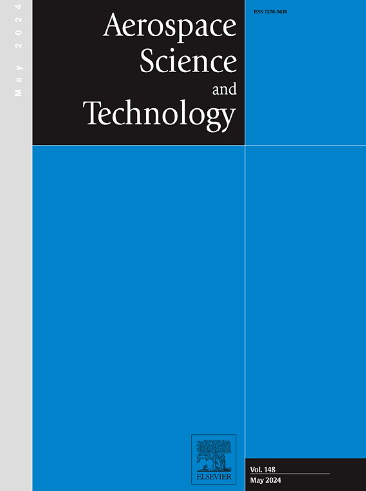Numerical research on flow field structure and droplets distribution of kerosene-fueled rotating detonation ramjet engine
IF 5
1区 工程技术
Q1 ENGINEERING, AEROSPACE
引用次数: 0
Abstract
In order to reveal the multiphase flow field structure and fuel droplets distribution under rotating detonation ramjet engine fueled by liquid kerosene, non-premixed simulations coupled with an Euler-Lagrangian approach is adopted. Supersonic air is used as oxidizer and the total pressure and total temperature at the entrance of isolation are set as 1.2 MPa and 1100 K, respectively, with a Mach number of 1.9. It is shown that a single-wave is formed and typical rotating detonation wave structures are established under two different orifice spacing conditions, namely 2 mm and 6mm. A "rich oil and poor oxygen band" is formed and attributed to the inconsistent supply of fuel and air after the passage of the detonation wave. When the orifices spacing is increased from 2 mm to 6 mm, both obvious strips after the detonation wave and “n-type” deflagration structures near the contact surface are observed. Besides, the detonation wave front becomes discontinuous, as well as from the deflagration heat release distribution. Despite of the effect of the circumferential propagation of detonation wave, kerosene droplets still propagate mainly along the downstream direction. However, Kerosene droplets distribution shows obvious difference along the detonation wave propagation direction.
煤油燃料旋转爆破冲压式喷气发动机流场结构和液滴分布的数值研究
为了揭示以液态煤油为燃料的旋转爆燃冲压式喷气发动机的多相流场结构和燃料液滴分布,采用了欧拉-拉格朗日非预混合模拟方法。使用超音速空气作为氧化剂,隔离区入口处的总压力和总温度分别设定为 1.2 MPa 和 1100 K,马赫数为 1.9。结果表明,在 2 毫米和 6 毫米两种不同的孔口间距条件下,形成了单波和典型的旋转爆轰波结构。形成 "富油贫氧带 "的原因是爆轰波通过后燃料和空气的供应不一致。当喷孔间距从 2 毫米增加到 6 毫米时,既能观察到明显的爆轰波后条带,又能在接触面附近观察到 "n 型 "爆燃结构。此外,爆轰波前沿变得不连续,从爆燃放热分布来看也是如此。尽管受到爆轰波周向传播的影响,煤油液滴仍主要沿下游方向传播。但煤油液滴的分布沿爆燃波传播方向有明显差异。
本文章由计算机程序翻译,如有差异,请以英文原文为准。
求助全文
约1分钟内获得全文
求助全文
来源期刊

Aerospace Science and Technology
工程技术-工程:宇航
CiteScore
10.30
自引率
28.60%
发文量
654
审稿时长
54 days
期刊介绍:
Aerospace Science and Technology publishes articles of outstanding scientific quality. Each article is reviewed by two referees. The journal welcomes papers from a wide range of countries. This journal publishes original papers, review articles and short communications related to all fields of aerospace research, fundamental and applied, potential applications of which are clearly related to:
• The design and the manufacture of aircraft, helicopters, missiles, launchers and satellites
• The control of their environment
• The study of various systems they are involved in, as supports or as targets.
Authors are invited to submit papers on new advances in the following topics to aerospace applications:
• Fluid dynamics
• Energetics and propulsion
• Materials and structures
• Flight mechanics
• Navigation, guidance and control
• Acoustics
• Optics
• Electromagnetism and radar
• Signal and image processing
• Information processing
• Data fusion
• Decision aid
• Human behaviour
• Robotics and intelligent systems
• Complex system engineering.
Etc.
 求助内容:
求助内容: 应助结果提醒方式:
应助结果提醒方式:


